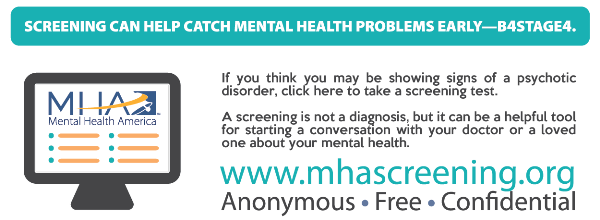You are here
Psychosis
Psychosis is a general term to describe a set of symptoms of mental illnesses that result in strange or bizarre thinking, perceptions (sight, sound), behaviors, and emotions. Psychosis is a brain-based condition that is made better or worse by environmental factors - like drug use and stress.
How Common is Psychosis?
One frequently cited statistic is that 1% of the population is diagnosed with Schizophrenia in their lifetime, but actually 3.5% of the population experiences psychosis. Hearing voices and seeing things that aren’t there are more common than we think. While these experiences can be scary and confusing, it is possible to recover and getting better, especially when we tackle issues early.[1]
What are the Different Kinds of Psychotic Disorders?
Conditions that have psychosis as a main symptom are referred to as psychotic disorders; however, psychosis may also occur as a feature of other disorders like bipolar or major depression. Some of the more common types of psychotic disorders include:
Schizophrenia: is a serious mental health disorder that affects how a person thinks, feels, and acts. People with schizophrenia may have trouble distinguishing what is real and what is imaginary.
Schizophreniform Disorder: consists of the same symptoms of Schizophrenia but occurs for a time period of at least one month but no more than six months. If symptoms last longer than this period, a person is given a diagnosis of Schizophrenia. [2]
Schizoaffective Disorder:is characterized by persistent symptoms of psychosis resembling schizophrenia with additional periodic symptoms of mood (or affective) disorders.
Delusional Disorder: is characterized by irrational or intense belief(s) or suspicion(s) which a person believes to be true. These beliefs may seem outlandish and impossible (bizarre) or fit within the realm of what is possible (non-bizarre). Symptoms must last for 1 month or longer in order for someone to be diagnosed with delusional disorder.
Brief Psychotic Disorder: includes symptoms of psychosis that last at least 1 day but no longer than 1 month. Symptoms are typically sudden and are sometimes responses to a stressful life event. While an individual may experience severe distress during the episode, people quickly return to their daily lives and their symptoms do not return.[3]
Schizotypal Disorder: is a personality disorder that can easily be confused with schizophrenia due to the nature of people with schizotypal personality disorder to have "magical" or eccentric beliefs, unusual thoughts and paranoia. People with schizotypal personality disorder may experience brief psychotic episodes with delusions or hallucinations, but the episodes are not as frequent, prolonged or intense as in schizophrenia.[4]
Symptoms of Psychotic Disorders
When trying to figure out if something is going on, it’s important to keep a few things in mind. A person might experience one symptom, but it’s more concerning when someone experiences more than one symptom. A change for one or two days might be a related to sleep or stress, but experiencing symptoms for more than a few days or weeks, is worthy of an evaluation by a mental health professional. If you’re concerned about a loved one, pay attention to sudden changes in their thoughts, emotions, and behaviors. Changes that seem really out of character might be early warning signs of psychosis. The following is a list of symptoms of psychosis:
- Hearing or seeing something that isn’t there
- A constant feeling of being watched
- Disorganized or bizarre speech or writing
- Inappropriate or unusual behavior
- Strange body movements or positioning
- Feeling indifferent or numb about important situations
- Deterioration of academic or work performance
- A change in personal hygiene and appearance
- A change in personality
- Increasing withdrawal from social situations
- Irrational, angry or fearful response to loved ones
- Inability to sleep or concentrate
- Extreme preoccupation or fears that seem bizarre
Please be aware that the screening is to identify individuals who are at ultra high-risk for psychosis, which means that being identified as possibly at-risk is sensitive. Overall, if you’re concerned it’s a good idea to reach out to someone you trust.
Getting Help
Recovering from psychosis is possible and treatment can make a big difference. If you are a young person and you think you might be showing the early signs of psychosis, visit Partners for Strong Minds and learn more about specialized supports that can help.
If you’re an adult struggling with psychosis, visit our Finding Help page, or use our Where to Get Help Interactive Tool to find the best treatment options for you.
To learn more visit:
- Schizophrenia
- Schizoaffective Disorder
- Paranoia and Delusional Disorders
- Psychosis (Schizophrenia) in Children and Youth
- Infographic: Life with Psychosis
- Staying Well When You Have a Mental Illness (PDF)
En Espanol:
From our Partners:
Read stories from people living with psychosis on The Mighty.
Sources
[1] Perälä J, Suvisaari J, Saarni SI, et al. Lifetime Prevalence of Psychotic and Bipolar I Disorders in a General Population. Arch Gen Psychiatry. 2007;64(1):19-28. doi:10.1001/archpsyc.64.1.19.
[2] American Psychiatric Association. (2014). Understanding Mental Disorders: Your Guide to DSM-5. Washington, DC: American Psychiatric Publishing.
[4] http://www.mayoclinic.org/diseases-conditions/schizotypal-personality-disorder/symptoms-causes/dxc-2...









this page